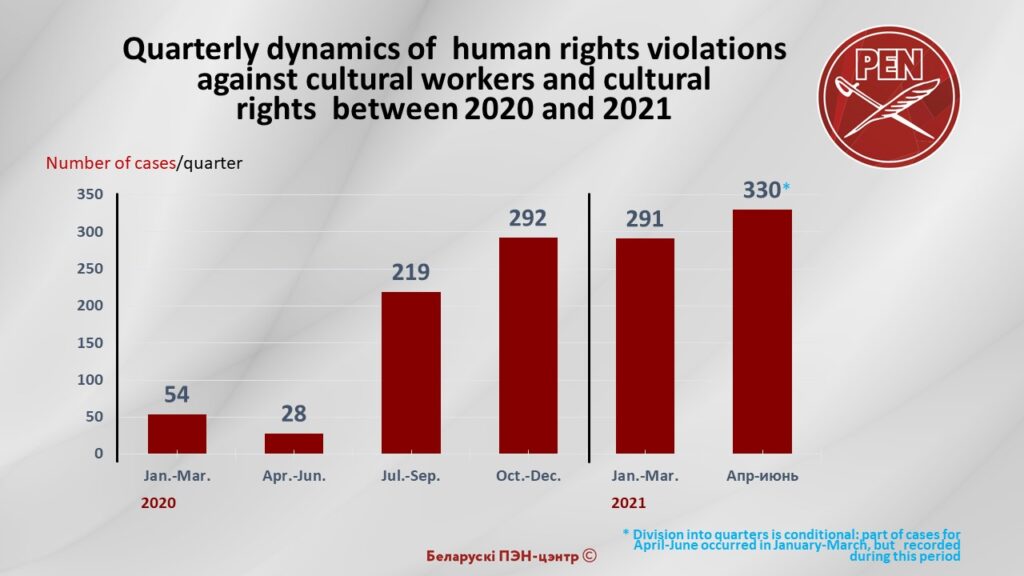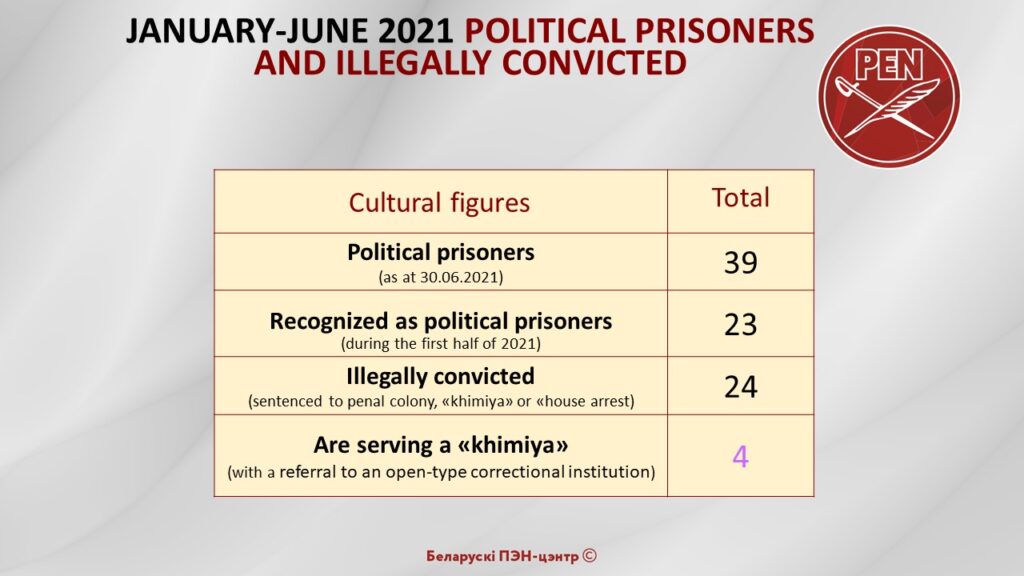- eTurboNews as an independent publication standing behind PEN America’s sister Organization PEN Belarus.
- The Belarusian Justice Ministry has moved to shut down PEN America’s sister organization PEN Belarus. It comes amid raids this week on the offices of organizations and media outlets.
- PEN Belarus received notice of the ministry’s intent to liquidate the organization the same day the group released a report showing in increase in cultural rights violations in the country.
PEN America stands at the intersection of literature and human rights to protect free expression in the United States and worldwide. We champion the freedom to write, recognizing the power of the word to transform the world. Our mission is to unite writers and their allies to celebrate creative expression and defend the liberties that make it possible.
eTurboNews is a member of PEN America.
The letter sent to PEN Belarus on July 22 reads:
The Supreme Court of the Republic of Belarus initiated a civil case on the claim of the Ministry of Justice of the Republic of Belarus against the Republican Public Association ‘Belarusian PEN Center’ for liquidation.
The representative of the Republican Public Association ‘Belarusian PEN Center’ must appear at the specified time with documents confirming the authorization to participate in the case.
The saddest thing is that I see no end to it all. There is a total clean-up of the Belarusian world. They destroy according to a devilish plan.
The Belarusian PEN Center systematically collects information on the implementation of cultural and human rights with regard to cultural workers.
From August 2020 to the present, we have been witnesses and documentaries of the prearranged high pressures placed on all of free society and cultural figures in particular. This is a tragic time for freedom of expression, freedom of creativity, freedom of opinion, etc. The socio-political crisis is characterized by the violation of fundamental human rights and freedoms, persecution for dissent, censorship, an atmosphere of fear, and the expulsion of proponents of change.
This document contains statistics and examples based on the collection and synthesis of information from open sources, correspondence and personal conversations with cultural figures for the period from January to June 2021.
During the first half of 2021, we noted 621 cases of human and cultural rights violations.
The number of violations in January-June 2021 is more than the volume of recorded cases for the entire year of 2020 (593) (We are talking specifically about the cases of 2020, which were included in the monitoring review during that year. While collecting data on cases in 2021, we also continue to record the missed cases from 2020. It means that there were more of them.). It can be argued that the pressure and repressions, which have been especially strong since August 2020, and which started during the presidential campaigns, have not weakened, instead the repressions are acquiring new forms and are affecting an ever-widening range of Belarusian cultural subjects.
The dynamics of recorded violations since 2020:

As of June 30, 2021, 526 people were recognized as political prisoners in Belarus. Of the total number of political prisoners, 39 are cultural workers.
Among them:
- Paviel Sieviaryniec, writer and politician – 25.05.2021 sentenced to 7 years in a maximum-security colony;
- Maksim Znak, lawyer, poet and songwriter – has been in a detention facility since 18.09.2020;
- Viktar Babaryka, patron of the arts – 06.07.2021 (The sentences that we knew in the process of drafting the text) sentenced to 14 years in a maximum-security penal colony;
- Ihnat Sidorčyk, poet and director – 16.02.2021 sentenced to 3 years of “khimiya” (Colloquially, one of the types of punishment is called “khimiya”, meaning a restriction of freedom with a referral to an open-type correctional institution);
- Miokola Dziadok, activist of the anarchist movement, author of prison literature – has been in a detention facility since 11.11.2020;
- Julija Čarniaŭskaja, writer and cultural scientist – since 20.05.2021 she has been under house arrest (without the possibility of going out or having any communication with the outside world, except with her lawyer);
- Kaciaryna Andrejeva (Bachvalava), author and journalist – 18.02.2021 sentenced to 2 years in a penal colony;
- Andrej Pačobut, poet and member of the “Union of Poles” – has been in a detention facility since 27.03.2021;
- Andrej Alaksandraŭ, poet, journalist and media manager – has been in a detention facility since 12.01.2021;
- Maryja Kaleśnikava, musician and manager of cultural projects – has been in a detention facility since 12.09.2020;
- Ihar Bancar, musician – 19.03.2021 sentenced to 1.5 years of “khimiya”;
- Aleksey Sanchuk, drummer – 13.05.2021 sentenced to 6 years in a maximum-security penal colony;
- Anatol Khinevich, bard– 24.12.2020 sentenced to 2.5 years in a penal colony;
- Alaksandr Vasilevič, manager of cultural projects and businessman – has been in a detention facility since 28.08.2020;
- Eduard Babaryka, cultural manager – has been in a detention facility since 18.06.2020;
- Ivan Kaniavieha, director of a concert agency – 04.02.2021 sentenced to 3 years in a penal colony;
- Mia Mitkevich, cultural manager – 12.05.2021 sentenced to 3 years in a penal colony;
- Liavon Khalatran, cultural manager – 19.02.2021 sentenced to 2 years of “khimiya”;
- Andżelika Borys, chairwoman of the “Union of Poles in Belarus” – has been in a detention facility since 23.03.2021;
- Ala Sharko, art researcher- has been in a detention facility since 22.12.2020;
- Ales Pushkin, artist – has been in a detention facility since 30.03.2021;
- Siarhei Volkau, actor – 06.07.2021 sentenced to 4 years in a maximum-security penal colony;
- Danila Hancharou, lighting designer – 09.07.2021 sentenced to 2 years in a penal colony;
- Aliaksandr Nurdzinau, artist – 05.02.2021 sentenced to 4 years in a maximum-security penal colony;
- Uladzislau Makavetski, artist – 16.12.2020 sentenced to 2 years in a penal colony;
- Artsiom Takarchuk, architect – 20.11.2020 sentenced to 3.5 years in a penal colony;
- Rastsislau Stefanovich, designer and architect – has been in a detention facility since 29.09.2020;
- Maksim Taccianok, designer – 26.02.2021 sentenced to 3 years of “khimiya”;
- Piotr Slutski, cameraman and sound engineer – has been in a detention facility since 22.12.2020;
- Pavel Spiryn, screenwriter and blogger – 05.02.2021 sentenced to 4.5 years in a penal colony;
- Dzmitry Kubarau, UX / UI designer – 24.03.2021 sentenced to 7 years in a maximum-security penal colony;
- Ksenia Syramalot, poet and publicist, student of the Faculty of Philosophy and Social Sciences of the Belarusian State University – 16.07.2021 sentenced to 2.5 years in a penal colony;
- Yana Arabeika and Kasia Budzko, students of the Faculty of Aesthetic Education of the Belarusian State Pedagogical University – 16.07.2021 were sentenced to 2.5 years in a penal colony;
- Maryia Kalenik, student of the Faculty of Exhibition Design at the Academy of Arts – 16.07.2021 sentenced to 2.5 years in a penal colony;
- Viktoryia Hrankouskaya, former student of the Faculty of Architecture of the Belarusian National Technical University – 16.07.2021 sentenced to 2.5 years in a penal colony;
- Ihar Yarmolau and Mikalai Saseu, dancers – 10.06.2021 sentenced to 5 years in a maximum-security penal colony;
- Anastasiya Mirontsava, artist, expelled since last year, student of the Academy of Arts – 01.04.2021 sentenced to 2 years in a penal colony.
Temporarily, the cultural manager Dzianis Chykaliou has the status of a “former” political prisoner, since at the moment he is free under recognizance not to leave the country. But in pursuance of the sentence, he will be forced to go to an open-type correctional institution (for “khimiya”: sentenced to 3 years).

In the first half of 2021, 24 prosecuted cultural workers were unlawfully convicted. Among them are both those who have been recognized as political prisoners and those without this status. 13 cultural workers were sentenced by the court to a penal colony for a sentence of 2 to 8 years (7 have been sentenced to a high-security penal colony), 9 cultural workers – sentenced to 1.5-3 years of “khimiya”, 2 cultural workers- sentenced to 1-2 years of “house arrest” (restriction of freedom without referral to an open-type correctional institution).
A characteristic “feature” of the second half of the year is that cultural workers who were sentenced to “khimiya” and later released home for a while after the announcement of the verdict, began to receive referrals in June to serve their sentences in open institutions. So, in June, cultural manager Liavon Khalatran, poet and director Ihnat Sidorchyk, musician Ihar Bancar and designer Maksim Taccianok were sent to “khimiya”. Court appeals of unlawful sentences did not lead to a change in the measure of restraint.
Within the scope of our research we have also focused on the detention conditions in closed institutions. In the period January-June 2021, we identified 44 situations with a description or mention of the conditions that prisoners face in detention. These descriptions are limited to information available to us through the media and through the publications of relatives. We understand that the limited sources of information, the difficult and often absent correspondence with prisoners, and the strict framework of prison censorship do not allow us to declare completeness of the information; however, even on the basis of the available facts, we argue that the conditions of detention constitute, at a minimum, cruel and degrading treatment, and in some cases show signs of torture.
Examples of detention conditions:
- Maxim Znak conveyed that he had not seen darkness for 9 months. The lights are constantly on in his cell.
- During the court hearing on April 26, Zmitser Dashkevich said that “parallel conditions were created for political detainees: political detainees are woken up at times that differ from the other prisoners,, there are checks at night, a lack of mattresses, offensive attitude and lack of packages.”
- A cell designed for 4 people held 12 people. Valery spent 20 days without a mattress and blanket. For 2 days in a row, political prisoners were forced to listen to the broadcast of the All-Belarusian People’s Assembly. During the 20 days of his arrest, Valery was never taken to a shower and never received packages from his family.
- “A special type of torture is radio, which works around the clock and sometimes at night.”
- The wife of Andrzej Poczobut said that the administration of the pre-trial detention center is not giving her husband his heart medications. Andrei has an irregular heartbeat. The medicine was taken to the Zhodino detention center but the administration has not given it directly to Poczobut .
- “He’s not getting any healthier. He is yellow. Sometimes he stops turning yellow, becomes normal, white. Then gray, then yellow again. His eyes are always filled with pus. The ligaments on the leg were torn and he needs an operation or the ligaments will be torn. His filling fell out, he cannot get it done in prison. “
- “Yellow tag with her first and last name. I want to clarify right away: no, this is not a special mark specifically for political ones. But this is a form of segregation of prisoners – that is, not all prisoners wear yellow tags, but only a special contingent registered as a prophylactic for their propensity to “extremism”. By the way, such segregation is not an innovation – this practice has existed since at least 2019 ”.
Previously we mentioned arbitrary detention, criminal prosecution, illegal conviction and other situations–this is the list of the most frequently violated rights concerning cultural figures and people that exercise their cultural rights. Dissent (views different from those broadcast by government officials) is the main reason people have been prosecuted.

We also recorded an increase in the number of individuals leaving the country to ensure personal safety, language discrimination cases, and the right to use cultural products.
Special attention should be paid to the increase in administrative and criminal liability for the use of national symbols. This practice has developed throughout the country. Until now, the white-red-white flag and the coat of arms “Pagonya” have not been recognized as extremist, but now people are being held accountable not only for their use of the flag but also for variations in the use of the color combinations of historical symbols. The use of national symbols is not the main focus of our research, but more than 400 cases across the country were captured in our field of vision alone in six months.
Starting from January of this year, non-state publishing houses, publishers, book distributors, independent press, including those with content on cultural topics, authors, and often readers themselves, have come under pressure. So,
- In January, publishers Hienadź Viniarski and Andrej Januškievič were detained and interrogated. Searches were carried out in the publishing houses “Januskevic” and “Knigosbor”. Computers, telephones and books were confiscated. The accounts of both publishers, as well as the online bookstore knihi.by, were blocked and remained so for 146 days (almost 5 months) until they were unblocked on June 8.
During this time, the activities of publishing houses were almost paralyzed, and the organizations themselves were threatened with closure: there were losses, problems with finding resources for new books, and there was no opportunity to pay printing houses.
The publishing house “Logvinov” is also on hiatus. The bookstore is closed and only works online. - We have regularly received the news that the Belarusian customs did not allow books by certain authors and/or publishers to pass. Thus, the novel by Viktar Marcinovič “Revolution” (sender – knihi.by) was not allowed abroad. The book “Belarusian National Idea” by Zmitser Lukashuk and Maksim Goryunov also did not get to foreign customers.
The reprinted novel “Dogs of Europe ” by Alhierd Bacharevič, which arrived from Lithuania to the Yanushkevich publishing house with a circulation of 1000 copies, was sent for a customs inspection and examination for the presence (absence) of extremism in it. The conclusion was not provided after 30 calendar days; today the circulation has been under verification for 3 months. - The book “Belarusian Donbass” by Kaciaryna Andrejeva (Bachvalava) and Ihar Iljaš was declared extremist. Ihar Iljaš’s appeal against the recognition of the book as extremist material was rejected – it remains in this status. Journalist Roman Vasyukovich, who imported two copies of the book into the Republic of Belarus even before it was declared extremist, was convicted and, as a result, fined 20 basic units (about $220).
- It was concluded that the book “Belarusian National Idea” contains “signs of the manifestation of extremism”. However, there is no information about the court which ruled that the book contains extremist materials and presently the book is not listed on the official list of extremist materials. Nevertheless, a lawsuit was underway against a resident of the Minsk region, Jahor Staravojtaŭ [Yegor Starovoitov], who was tried for possession of this book, which was purchased from a state bookstore and seized before it was found to contain “signs of extremism.” The trial against Jahor Staravojtaŭ was terminated only due to the expiration of the term for bringing to administrative responsibility (2 months).
- Another case of the punishment of readers was the detention of pensioners for “participating in an unauthorized action” – reading books written by Belarusian writers on the train: Nil Hilevich, Yakub Kolas, Uladzimir Karatkievich and other classic authors. During interrogation, the police officer called these books opposition literature.
- We have recorded that several books were discredited on national television. These are books by Uladzimir Arloŭ (” Imiony Svabody“), Alaksandar Lukašuk (“The Adventures of ARA in Belarus“), Uladzimir Nyaklyayew (“Kon”), Paviel Sieviaryniec (“National Idea”), Aleh Latyshonak (“Žaŭniery BNR”), ” Kalinoŭski na Svabodzie “and” “Slounik Svabody” “published by Radio Svaboda, ARCHE Magazine and others.
- The enterprise “Belsoyuzpechat” unilaterally terminated contracts for the sale of printed publications, among which was a press with content on the topic of culture including the newspaper “Novy Chas” and the magazine “Nasha Gistorya”. Immediately after, Belpochta also terminated the contract with these editions, and subscriptions are no longer offered since July 2021. Some government-owned bookstores have also given up sales.
- It is known that the administration of “Belkniga” removed books by several authors from the shelves of their stores: Viktar Kaźko , Uladzimir Nyaklyayew, Marcinovič Viktar and others. The company also terminated the contract for the production of “Theories of Literature of the 20th Century” (a book edited by Lyavon Barshchewski) ahead of schedule.
- Circulars began to come to the libraries demanding to remove the books of the Harvest publishing house about military history, particularly the books by Viktar Lachar “Military history of Belarus. Heroes. Symbols. Colors” and “Military symbols of Belarusians. Banners and uniforms”. It is also known that Alhierd Bacharevič’s books are removed from state libraries.
ART SPACES AND CULTURE ORGANIZATIONS
Since the beginning of 2021, we have recorded a trend aimed at creating obstacles to the activities of independent cultural spaces. This trend not only continued throughout the past six months but also transformed into extreme forms of pressure on these organizations. The repressions began with interrogations of managers, searches, seizure of documents and property, and continued in the form of numerous reviews by the Financial Investigation Department, the Tax Inspectorate, units of the Ministry of Emergency Situations, etc. These repressions ultimately have turned into an extreme form of administrative pressure – the liquidation of organizations.
- At the beginning of the year, the owner of the premises unilaterally terminated the lease agreement with the Ok16 Cultural Hub, as a result of which all (mainly theatrical) events were canceled. Later searches were conducted in the cultural center “Druhi Pavierch” [The Second Floor] and Space KH (“Kryly Chalopa”). In April, the Emergencies Ministry and the sanitary station came to the “Mestsa” event space, as a result of which the site was closed until the violations were corrected.
- The bar and art space The Third Place (“Третье место”) in Grodno and the Red Pub were forced to close. The Minsk musical club Graffiti (“Граффити”) was also presented with obstacles (the club closed but later was able to open again). The festival of modern art Moving Art Festival was cancelled and the art space MAF was completely shut down.
- Beginning in April, administrative pressure intensified and began to take the extreme form of liquidation. So, on April 19, the Economic Court of the Brest region decided to liquidate “The Polish School” LLC (“in order to protect state and public interests”). On May 12, the Economic Court of Grodno ruled to liquidate the cultural and educational institution “Center for Urban Life” (the reason is the exhibition of Ales Pushkin, which allegedly showed a picture falling under the Law on Countering Extremism.). On June 18, it became known that in Brest authorities liquidated the socio-cultural institution “Kryly Chalopa Theater” and the cultural and educational “Grunt budushchego”. The basis is the implementation of activities that do not correspond to the goals and subject stated in the charter. On June 30, the authorities demanded to stop the activities of the Goethe-Institut and the German Academic Exchange Service (DAAD) in Belarus, the main organizations for the study of German language and culture around the world. (As of the first days of the second half of the year, it has been made known that the Brest Regional Development Agency “Dzedzich”, which held a culture festival and other cultural events, has been liquidated).
- Another way to put pressure on organizations is unscheduled inspections from the Ministry of Justice. Public organizations began to receive letters on the monitoring of their compliance with the requirements of the Belarusian legislation. The list of requested documents goes into dozens of items, affects about 3-4 years of the organization’s activity, and the letters themselves with the notification of the ongoing inspection come with a week’s delay, as a result of which only a few days, if not a day, are left for collecting the requested documents. It is known that such a letter was received by the “Belarusian PEN-Center” and the “Belarusian Committee of the International Council for Monuments and Sites (ICOMOS)”. (As of the first days of the second half of the year, it is also known that such a letter has been received by the “Batskaushchyna” and “The Union of Belarusian Writers”). As of the end of June, it is known that the “Belarusian Committee of ICOMOS”, following the results of the audit, received a letter from the Ministry of Justice with the issuance of a warning to the organization in connection with violations of the law and the need to take a set of measures to eliminate the violations.
COMMERCIAL ORGANIZATIONS
Back in 2020, “war was declared” on commercial initiatives that built a business on the national segment (national symbols, souvenirs). So, during the past six months, and especially in the first quarter of the year, all over Belarus obstacles were created for stores that sold national symbols and clothes: “Kniaź Vitaŭt”, Symbal.by, “Roskvit”, “Moj modny kut” , Vokladki, БЧБ.bel, “Admetnasts”, “Cudoŭnaja krama”, “Chameleon”, LSTR Adzieńnie, workshop moj rodny kut, designer clothes brand Honar. The shops and/or the owners were inspected by employees of all kinds of services: the Ministry of Emergency Situations, the FDI, the Department for Combating Economic Crimes, the Department for Combating Organized Crime, the police, the OMON, the Labor Protection Inspectorate, the State Standard, etc. In June, the store “Admetnasts” was also visited by representatives of the ideology department of the city executive committee with claims to goods that had red and white colors.
Some stores and organizations were forced to cease their activities in part or in whole:
- Due to numerous checks, courts, fines and seizure of products, the Brest online store “Kniaź Vitaŭt” is closed.
- Offline and pick up stores of Symbal.by are closed. The store only sells digital goods.
- Offline store “Moj modny kut” no longer has a physical store; instead it now works exclusively as an online store The forced closure of Budźma-krama was announced.
- The Gomel store “MROYA” announced its imminent closure (for economic reasons).
QUESTIONS OF DISPUTED HISTORICAL MEMORY
A separate topic which occurs in the context of violations of the rights of cultural workers and cultural rights, but occupies a separate place in the discourse of officials, is the attitude towards contentious topics in the realm of historical memory.
In the rhetoric of state representatives, these attitudes have been positioned as the “prevention of the glorification of Nazism.” Thus, in the Mogilev region, for example, a working group has been created to investigate a criminal case on the genocide of the Belarusian people during the Second World War, and A. Dzermant, a researcher at the Institute of Philosophy of the National Academy of Sciences of Belarus, suggests collecting, documenting and presenting such facts to Western “partners”. In the first reading, the deputies of the Parliament adopted a bill on the prevention of the rehabilitation of Nazism. The Ministry of Culture of the Republic of Belarus, together with the Brest regional and Berezovsky regional executive committees, held actions dedicated to the events at the site of the concentration camp in the city of Bereza-Kartuzskaya (now Bereza, Brest region), although earlier the authorities showed no interest in this place.
As for violations within the framework of this topic:
- On 28 February, the Polish Social Scout School named after Romuald Traugutt held an event for the Day of Remembrance of the “Outcast Soldiers” at Brest. Authorities saw this as a heroization of Nazism. This event led to massive pressure on the Polish community, the “Polish cause”, and anti-Polish cultural policy in general. As a result, in March the leadership of the Union of Poles (not recognized in Belarus) was detained, and searches were carried out in institutions in Hrodna, Brest, Baranavičy, Lida, and Vaŭkavysk. Pressure on members and activists of the Union of Poles and the Polish minority throughout Belarus is still ongoing. The chairman of the Union of Poles, Andżelika Borys and a member of the union, Andrzej Poczobut, have been imprisoned since March and are being prosecuted. Director of the LLC “Polish School” Anna Paniszewa, the head of the Lida branch of the “Union of Poles” Irena Biernacka, and the director of a public school at the “Union of Poles in Volkovysk” Maria Tiszkowska, have also been imprisoned for the same criminal prosecution since March. On June 2 it became known that the three were taken to Poland. Andżelika Borys and Andrzej Poczobut refused to be deported. All of them were recognized as political prisoners.
- Also in March, under the threat of a criminal case against the actors, the “Kaddish” play was canceled (it was also supposed to take place at the Center for Urban Life in Grodno; the theme of the play was the Holocaust).
- A defamatory publication was recorded about the Natallia Arsennieva Literary Award and about the writer Natallia Arsennieva-Kushel herself, where she is called a “collaborator” who bowed to the white-red-white flag; allegedly anti-Semitic publications from the occupation are being attributed to her. (Note: Natalya Arsenyeva-Kushel – the writer of the anthem “Mahutny Boža” written in 1943, is being held accountable for its performance today).
CENSORSHIP AND CREATIVE FREEDOM
The criminal prosecution of the artist Ales Pushkin is underway, authors, books, publishing houses, exhibitions, performances, concerts, the anthem “Mahutny Boža”” and other cultural institutions and activities have been censored.
- Musicians and stage performers were denied touring certificates: Kasta, J: Morse, RSP, etc., SHT did not receive permission to play “The Former Son” based on the novel by Saša Filipienka [Sasha Filipenko], and the “Che Theatre” cannot find a platform to play their iconic play “Dziady”.
- The Maxim Sarychau’s exhibition “I can almost hear birds”, dedicated to Maly Trostenets (Little Trostenets), the largest Nazi death camp, lasted for less than an hour.
- The next day after the opening, the exhibition “The machine breathes, but I do not”, dedicated to Belarusian doctors and the challenges they faced during the year of the pandemic, was canceled. (Note: the exhibition took place in the Miesca event space).
- Two days ahead of schedule, a large exhibition of the art group “Pahonia”including the work “Aqua/areli +” by Ales Marachkin, was closed (two of the paintings were dedicated to Nina Bahinskaja [Nina Baginskaya] and Raman Bandarenka [Roman Bondarenko] – iconic personalities of the protest movement in Belarus).
- Without explanation, Viktar Barysienkaŭ’s photo exhibition “It’s time to remember”, did not take place in the regional museum of Vitebsk. (“It seems that someone saw an ideological sabotage in the photographs of destroyed churches”). A few days earlier, a lecture by a local historian in the regional library was also canceled.
- For reasons beyond Siarhiej Tarasaŭ‘s control, the presentation of his book “Eufrasinnya – Ofrasinnya – Aufrasinnya. Her time, her cross” was delayed.
- From Nadzia Buka’s [Nadia Buka] exhibition Asabistaja sprava” (Personal business) in Grodno, of 56 canvases, 6 suddenly disappeared – as it turned out, these are those that have a certain combination of white and red (it is typical that some of them were painted before 2020).
- Fearing possible persecution of the authors, the team of the documentary film festival WATCH DOCS Belarus postponed their online festival indefinitely. The play “White rabbit, red rabbit” by the HomoСosmos theater has been canceled a dozen times already. School ideologues make sure that students are taken to state museums, not private ones. In a Hrodna bar, the menu was censored (they demanded that faces and names be pasted over), in which portraits of famous Belarusians were printed. RTBD removed from its repertoire the play “Voices from Chernobyl” (based on the work of the Nobel laureate Sviatlana Aleksijevič). And Sviatlana Aleksijevič today is probably one of the most censored writers: her name was deleted from the cover of a magazine, she was not allowed to be mentioned in school literature classes, and the state media repeatedly defamed her honor and business reputation.
PUBLIC CULTURAL POLICY AND FINANCING
We have already cited examples of violations within each of the three groups of rights: civil and political rights (persecution for dissent, arbitrary detention, conditions of detention in closed institutions, defamatory statements, and others); cultural rights (censorship, freedom of creativity, the right to use symbols) and socio-economic rights (forced termination of activities, confiscation of property, creation of administrative obstacles to the implementation of activities and liquidation as its extreme form).
Another type of violation within the framework of socio-economic rights is the limited and selective nature of state support, in which non-state cultural actors are almost completely excluded from this system. Unlike state-run cultural institutions, non-state cultural actors do not receive subsidies or preferential treatment. So,
- At the end of March, the Council of Ministers issued a resolution with a modified list of public associations, unions and associations, and foundations for which a reduction coefficient of 0.1 to the base rental rate was set. However, since April the cost of renting premises has increased 10 times for 93 organizations, which most of them did not know and therefore did not have time to prepare in advance. Among the public organizations on the list are those whose activities directly affect the cultural sphere of the country: “Belarusian Library Association”, “Belarusian Union of Designers”, “Belarusian Union of Composers”, “Belarusian Union of Artists”, “Belarusian Cultural Fund”, “Belarusian Association of Clubs “UNESCO”, and “Belarus Dance Sport Alliance”.
- Private museums are experiencing difficulties- if state museums are subsidized by the state, then private ones lack support and are on the brink of survival. Thus, a special commission in the city executive committee has deprived the Grodno “Tsikavy Museum” a discounted coefficient for rent, so the bills have grown 6 times. In mid-April, it became known that the museum had closed. The rent for the Museum of Urban Life and History of Hrodna was also increased. For now, the owner covers the expenses at his own expense to preserve the museum. The museums of architectural miniatures – Grodno Mini and Minsk “Strana mini” – are also experiencing difficulties and are on the verge of survival.
- Other examples:
- one of the oldest organizations in the country encountered financial problems – the “Frantsishak Skaryna Belarusian Language Society ”. In 2020, the society managed to pay the rent for the premises only thanks to donations;
- the only publishing house in Belarus specializing in the production of local history and souvenir literature “Riftur” and the local history Internet resource planetabelarus.by are barely surviving;
- residents are fighting against the closure of the library in the village of Lielikava in the Kobryn region; the library was the only remaining cultural place in the rural area.
RIGHT TO WORK
This right also belongs in the group of socio-economic rights and is included in the Top 10 most frequently violated rights during the first half of 2021.
In almost every situation of dismissal recorded in our monitoring, the violation of the right to work is associated with persecution for dissent and the violation of the right to freedom of expression. It was these two components that led to the fact that cultural figures, previously seen in active civic positions, were either fired from their jobs or conditions were created to push them to resign.
Employees were dismissed / not renewed:
theaters: Mogilev Regional Drama Theater, Grodno Regional Drama Theater, National Academic Theater named after Yanka Kupala, Bolshoi Theater of Belarus, National Academic Drama Theater named after Maxim Gorky;
museums: the Museum of History of Mogilev, the Novogrudok Museum of History and Local Lore, the House-Museum of Adam Mitskevich in Novogrudok, the Museum of Belarusian Polesie, the State Museum of the History of Belarusian Literature and others;
educational institutions: Belarusian State Academy of Arts, Grodno State College of Music, Yanka Kupala State University of Grodno, Polotsk State University, Mogilev State University, Minsk State Linguistic University and other places.
DISCRIMINATION ON THE BELARUSIAN LANGUAGE
There were 33 situations of discrimination based on language. The overwhelming majority of them are about the Belarusian language (in second place is Polish). The situations concern both individuals and organizations as well as language discrimination at the national level.
Thus, we collected next cases:
- In everyday life:
- 65-year-old pensioner Adam Shpakovsky was detained in Minsk, neighbors complained about him for “annoying everyone with his Belarusian language.”
- On June 14, Yulia consulted a doctor at the Minsk District Polyclinic No. 19. When greeting, she spoke in Belarusian. In response, the doctor began to raise his voice and told Julia to speak “normal language.”
- In places of detention:
- On May 13, Zmitser Dashkevich, after serving an administrative arrest in Zhodina temporary detention center, wrote in the protocol in Belarusian that he had received the confiscated things in full and had no claims. The prison officer told Dashkevich to write the protocol in Russian. Zmitser refused, for which he received a blow to the shoulders.
- Valadar Tsurpanau was put in a punishment cell for three days for the second time because he speaks Belarusian.
- Illa Malinoŭski said that during his arrest and time in the Pinsk District Department of Internal Affairs (District Department of Internal Affairs) on April 22, he heard mocking expressions, insults and demands to speak Russian.
- At enterprises:
- Several manufacturers refuse to use the Belarusian language on the packaging and labels of their products.
- Many enterprises do not have a Belarusian-language version of their website.
- In education:
- The authorities are doing everything possible not to license the educational activities of the Nil Hilevič University, a Belarusian-language university, created by the Belarusian Language Society in 2018.
- Belarusian-speaking classes are also not supported. For example, in the village of Amielaniec, Kamianiecki district, Brest region, a rural school where instruction is conducted in Belarusian is being closed. According to the officials it is being closed due to a lack of necessary conditions and the small number of students.
- Difficulties with opening a Belarusian-speaking class due to barriers established by the education department. A general education school may refuse to provide education in the Belarusian language.
- In the regions of Belarus, instruction of the Belarusian language has decreased to the levels of foreign language instruction.
- There is a big problem in the lack of Belarusian-speaking speech therapists, as well as defectological literature in Belarusian.
OTHER CULTURAL RIGHTS
In addition to cases of punishment for transporting, storing or reading books mentioned in the section “Literature”, as well as the facts of discriminatory attitude towards the Belarusian language, other cases of violation of the cultural rights of Belarusians have been recorded. In particular:
- Creation of obstacles in the exercise of the right to use a cultural product: arbitrary detention of students in Belarusian language courses in Vaŭkavysk; escort of excursions or detention of excursionists in Polack, Navahrudak, Minsk; arrest and trials against spectators of a concert in Smaliavičy; the arbitrary detention and sentencing to 24 hours of administrative arrest for spectators of the play “White rabbit, red rabbit”.
- Violations related to compliance with the Law on the Protection of Historical and Cultural Heritage.
OTHER:
Separately, numerous cases have been recorded beyond the main monitoring:
- The purposeful discrediting of cultural figures in the state media.
- Fight against symbols (elimination of white-red-white symbols) and solidarity actions of the protest movement.
- Low management of state policy in the field of culture: the size of budgeting for public holidays, new appointments, propaganda, compulsory subscription to newspapers and others.
OTHER CULTURAL LOSSES:
- Children’s book stores across the country are being forced to close or are in extremely difficult financial situations.
- Along with the forced departure from the country to ensure personal safety, creative people are also leaving the country in search of self-realization. At the beginning of 2021, the actors of the Hrodna theater who lost their jobs left for Lithuania. On July 9, their first performance took place in Vilnius. The modern art theater was forced to emigrate from Belarus and resumed its work in Kyiv. On May 20, it was there that the premiere of the play based on the novel by Saša Filipienka [Sasha Filipenko] “Former Son” took place. For at least the next year, accordionist and composer Jahor Zabielaŭ [Yegor Zabelov] has emigrated to Poland. Historian, candidate of art history, and lecturer Jaŭhien Malikaŭ, who was dismissed from the university, went to Poland for a one-year internship. More cases of this nature were observed..
INSTEAD OF CONCLUSION:
It is difficult to serve art when “the country has no time for laws”, when all norms – legal and human – have been violated.
WHAT TO TAKE AWAY FROM THIS ARTICLE:
- The Supreme Court of the Republic of Belarus initiated a civil case on the claim of the Ministry of Justice of the Republic of Belarus against the Republican Public Association ‘Belarusian PEN Center' for liquidation.
- 2021 sentenced to 3 years of “khimiya” (Colloquially, one of the types of punishment is called “khimiya”, meaning a restriction of freedom with a referral to an open-type correctional institution);Miokola Dziadok, activist of the anarchist movement, author of prison literature – has been in a detention facility since 11.
- The number of violations in January-June 2021 is more than the volume of recorded cases for the entire year of 2020 (593) (We are talking specifically about the cases of 2020, which were included in the monitoring review during that year.























